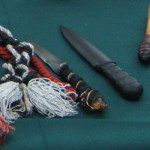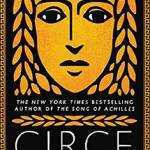It was a week after our wedding anniversary. My anniversary present that year: they told me that my husband was going to live. A month before a car accident had just about taken his life. The Lady and Lord gave him back to me.
But for a month he had been wandering in the Underworld and it had been a very close thing. So on the week of our anniversary, he was really just starting to come back to consciousness. And as he was struggling to sort a nightmarish sort of Butterfly Effect reality from morphine-muddled hallucinations, it began apparent that for some reason he could hardly move at all. He was almost completely paralyzed.
The doctors struggled to figure this out, because it wasn’t consistent with his injuries. He had some head trauma but nothing in the areas that affect mobility; he had no spinal injuries save whiplash. And it was a couple of days later that I was chatting with the intern who had saved his life a couple of weeks before, and I was fretting about it.
He said, “I have an idea what it might be but I’m not sure yet.”
“What?” I demanded.
“I don’t want to tell you,” he admitted. “It’s not an official diagnosis.”
I felt no qualms in this case about fishing for information through guilt. “You can’t mention to me that you might know what it is and then not tell me,” I scowled. “Come on, you know we’ve all been desperate for information. I understand it’s not an official diagnosis.”
“Well,” he ruminated reluctantly, “it might be something called post-ICU neuropathy.”
“What’s that?”
But I had pushed him enough. “No,” he said, shaking his head. “No, I’ve told you too much already, especially since we’re not sure yet.”
But I’m stubborn, and I took myself down to the after-hours computer terminal provided for the use of the patients and their visitors. I waited because there was a man using it when I came down, even though the rest of the hospital seemed deserted, save the normal nighttime rhythms. He was tall and very thin, bald as an egg and really dark-skinned (African-Canadian people aren’t uncommon in the Vancouver area, but rarely are they quite so dark,) and he was wearing a suit. Something about the suit seemed off to me, even though business suits are commonplace in downtown Vancouver at all hours of the day and night. It wasn’t until much later that it struck me; it was a sharp pinstriped suit, something that an undertaker might wear. I was crawling with the chance to do the research I needed to do, but I didn’t interrupt. Something about this man demanded patience and respect.
After a time, he glanced at me out of the corner of one eye and he said, “You want to use this, do you?” His voice was a rich resonating basso, thick with a heavy accent that struck me as Caribbean; Haitan, perhaps.
“Yes, please.” My voice surprised me; it was the meek tone of a polite child, very out of character.
He nodded. “Don’choo worry,” he smiled. “I’m almost finished.” He clicked around for a few more moments on the mouse and I was fascinated by his long, graceful, bony fingers. “There, that’ll do,” he chuckled. He left the terminal. “I hope you find what you’re looking for, pretty lady.” He offered me another smile and headed down the corridor and towards the exit.
He had not bothered to close what he had been working on. It was some site on difficulties of crossing borders for college students. There was another window open as well; something about death customs. I didn’t look too closely because I didn’t want to invade privacy. I opened up another window for my research.
“Post-ICU neuropathy,” it turned out, was nerve damage caused by degeneration in the ICU. It seems that just as muscle tissue degenerates, so does nerve tissue. Damage is generally disabling, though in lesser and greater degrees. Usually some of it is permanent.
This was just one too many straws after five terrifying weeks of life and death drama. I burst into tears. It lasted for several minutes and I wiped angrily and impatiently at the waterworks. I didn’t need this right now. It would help no one. But visiting hours, even in the ICU, were over, so disheartened and completely defeated, I headed for the exit. The tall African-Canadian man had disappeared completely.
It was a very lonely wait nightly at the bus stop as I prepared to head back to the basement suite that I was generously being permitted to stay in for free, which belonged to an old SCA friend of ours. He happened to have no tenants currently and it was right downtown, only a few blocks from Vancouver General Hospital. However, I was alone, even though in Vernon I lived with a big extended family. The decision had been made that my son would stay at home and continue to go to school; and I would stay with my husband, because somebody had to and I simply couldn’t imagine where else I would be. But the apartment was horribly empty and bare, except for a few donations from the local Pagan community (who really saved my life) and a couple of bare-minimum supplies I had from home, such as my laptop. I would put on the audio commentary of the Lord of the Rings extended edition CDs for company while I slept, just because I couldn’t handle so much silence when I lived with so many voices, and I would wake to ravens cawing outside my window.
That night, there was a big, internationally-famous fireworks festival going on in Vancouver, and I waited for a bus; but they were packed to capacity and five of them in a row just drove right by. Broadway Avenue isn’t a bad neighbourhood, but it isn’t a good one either and I realized that I wasn’t going to get a bus for several hours and people were beginning to stare at me.
I went back to the hospital, phoned up to the trauma unit, and explained the situation. They let me back in and I spent the next couple of hours at my husband’s side, mostly weeping while he slept his pain-fogged sleep.
After midnight, I figured I might be able to get a bus by this time, so I headed back down to the hospital exit. There, again, was the tall, thin gentleman with skin so dark his teeth seemed to glow, and he fell in step with me.
I should have been afraid. I should have been winding up my bag for a weapon. It was downtown Vancouver, after midnight, and this was a total stranger. But I wasn’t. Falling in step with him seemed the most natural thing in the world. I felt safe. I felt protected.
“All done for the night?” I asked him to make conversation.
He shrugged and nodded. “For now I think. Lots of work.” His voice gave me shivers, so rich it was.
“I had trouble getting a bus,” I explained, “because of the firework festival.”
As we headed for the door, he then said something which in retrospect struck me as something so odd that it should have made me run for the hills from the crazy person. At the time, it didn’t bother me at all. His smooth brow furrowed and what he said was, “That’s one thing about the modern world I just don’t understand; fireworks.”
I was amused. “What else about the modern world don’t you understand?” I asked curiously.
He smiled. “Jogging.”
We headed on to the street. For a moment he seemed . . . insubstantial? But then I blinked it away as an illusion caused by my exhaustion; which at that point was overwhelming.
“So what do you do for a living?” he asked me suddenly. It seemed he was going my way; we continued to walk in step.
I shrugged. “I guess I don’t know anymore. I was a taxi dispatcher, but I left that job to be here with my husband because he was in a major car accident.” What was I going to do now? I was sure that job was done with; it had been five weeks since I’d been back and I knew I was laid off. I had applied for EI; no money had come yet. Somehow I still kept getting by, mostly due to the generosity of others.
He smiled again. “Funny,” he said. “You strike me like an artist. A writer, maybe.”
“I used to want to be,” I sighed. I fell silent. I was overwhelmed by the weight of the fear and the burden of what lay ahead.
As we neared the corner where the bus stop was located, he engaged my eyes with his own. They were so full of compassion that I immediately began leaking from my own eyes. Kindly he said, “Everyt’ing gonna be all right. Don’choo worry. This, too, shall pass.”
And that’s when it struck me. This was not a human being I was talking to. Or at least, the force animating the body was not human.
I really saw this man I was speaking with for the first time. His eyes were luminous. Over the months before the accident, my husband had developed an interest in the Baron Samedi, lwa of the beloved dead, and of living life to the fullest. Awe and wonder rose in my chest and my heart started pounding with renewed hope.
“Thank you,” I whispered. “Oh, thank you for speaking with me.”
“You gonna be okay,” he assured me. “He gonna be okay too.” And I believed it.
“Blessed be,” I said to him with a deep nod of gratitude as he headed down Broadway Avenue; now in the opposite direction from the bus stop.
He laughed out loud. “Blessed be, then,” he grinned; and as I boarded the bus, which now stopped for me right away, he continued down the street and into the night. I glanced down to put my things by my seat. When I looked back, he was nowhere to be seen.
















